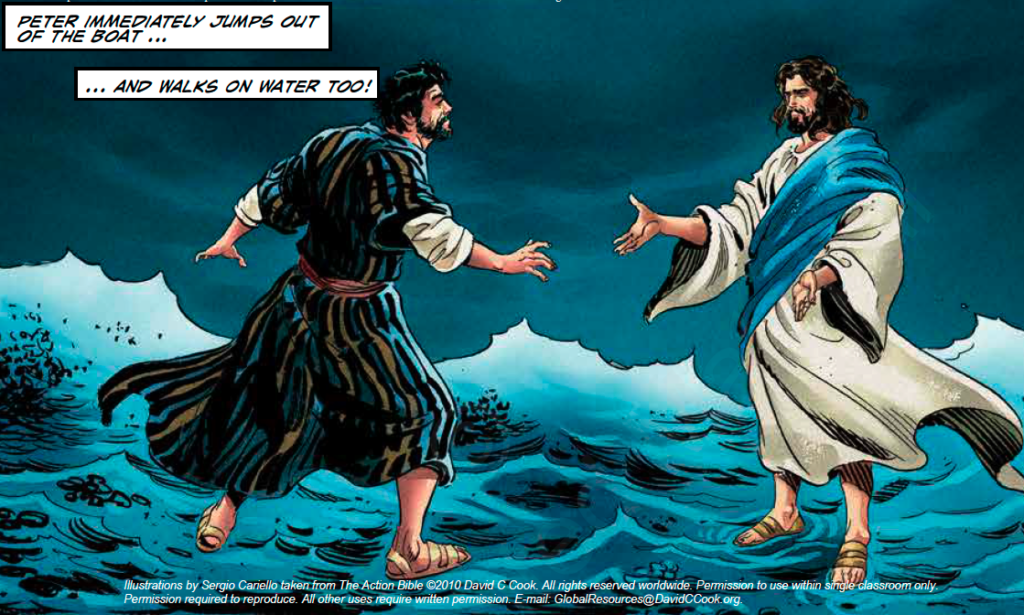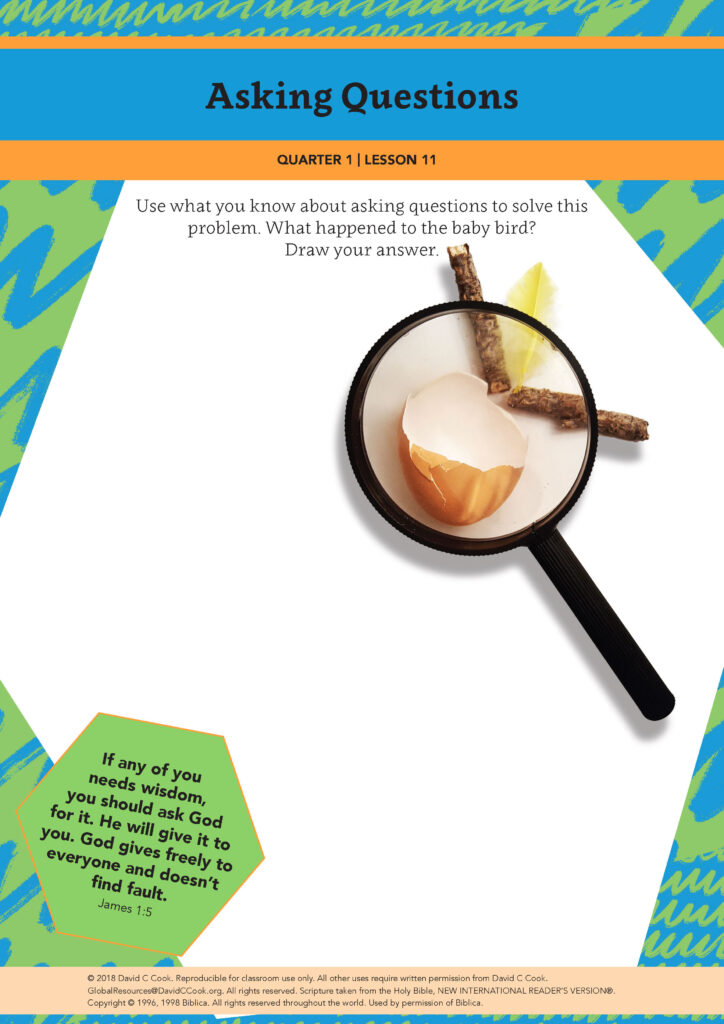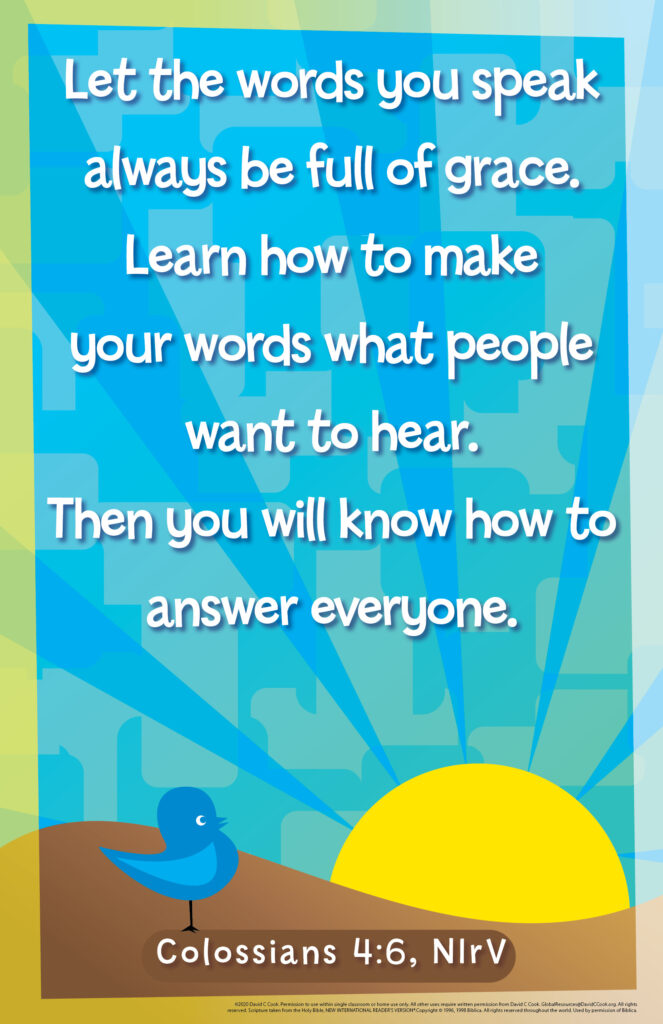During the lesson, the information for you to know is written in regular type, and what we suggest speaking or reading aloud to children is in bold. All resources for this lesson, including the Teacher Guide, Student Page, Family Connection Card, and other resources can be downloaded in a ZIP file by clicking on the following link:
In some lessons you will find "resource articles." These are articles written by experts from around the world to help equip you for your work with children and adolescents. Share them with parents or guardians if you consider it appropriate.
If any of you needs wisdom, you should ask God for it. He will give it to you. God gives freely to everyone and doesn’t find fault.
James 1:5
Everyone faces problems and needs wisdom to solve them. This Bible verse tells you to ask God for wisdom. God alone knows and understands everything. He gave you the ability to gain wisdom by asking questions and seeking the answers. God created you with a mind to use to solve problems.
Take time to think about the problems you have and seek wisdom to solve them. As you encounter problems this week, pause and pray. Ask God to help you find answers to these questions: “How can I find the information I need to solve this problem? Do I need to ask someone for help? Will becoming angry or frustrated help me solve this problem?” May God’s wisdom lead and guide you as you prepare to teach this lesson to the children.
Encourage your families to answer questions asked by their children this week. Explain that children ask a lot of questions because they are learning about the world around them.
Teacher Tip: If possible, email or text the Family Connection Card to the families of your students.
As the children enter the room, greet them by name and ask them questions to help you get to know them better, such as:
I asked you a question so I could learn more about you. Now, we will play “Who Has the Rock?” to see how asking questions can be helpful!
Have the children sit in a circle with their hands folded in their laps. Tell the children that you will give a small rock to 1 child to hide in his lap. The rest of them will try to guess who has it. Have everyone close their eyes. Walk around the circle 3 times. As you are circling around the children, secretly give the rock to 1 child to hide in his lap. Tell the children to open their eyes. Call on students to guess who has the rock. After someone correctly guesses, talk about the game.
You had to guess who had the rock. Guessing helped you find the person who had the rock. If you could ask the person who hid the rock questions, that would save you time. You could ask questions to get more information.
Let’s play the game again. This time, you can ask me questions such as: Is the person with the rock a boy or a girl? Does the person with the rock have a red shirt on? Is the person with the rock wearing brown shoes? These questions will help you discover who has the rock.
Tell the children to close their eyes again. Again walk around the circle 3 times and give the rock to a different child to hide in her lap. This time, let the children raise their hands and ask you questions to help them discover who has the rock. Play the game again if possible. The activity should take no more than 7 minutes total.
Asking good questions helped you find the rock. Sometimes we ask questions because we want to know facts. Sometimes we ask questions to help us solve a problem, just as we did in the game. Today, we will learn about asking good questions.
You will need a partner for this activity. When I ask you questions, you and your partner will talk about them and answer them together.
Pair each student with a neighbouring child for this activity.
The Bible tells us a true story about Jesus and His disciples. The disciples were followers of Jesus. It was a windy day. Jesus told His disciples to take a boat to the other side of the Sea of Galilee. They did as Jesus said, but Jesus did not join them. All that the Bible tells us is that Jesus sent the disciples to the sea. We do not know if the disciples knew why or where they were going.
Sometimes we ask questions to solve a problem. Let’s pretend we are detectives and we need to find out why Jesus wants the disciples to go out into the sea. A detective is someone whose job it is to solve a mystery. Talk to your partners about what questions we could ask ourselves about why we are sailing out into the sea.
Allow time for the children to form questions. They should also think about and discuss the possible answers to the questions they create. Here are some possible questions.
You are all great detectives! You thought of some wonderful questions.
Read these verses directly from your Bible.
The boat was already a long way from land. It was being pounded by the waves because the wind was blowing against it. Shortly before dawn, Jesus went out to the disciples. He walked on the lake.
Matthew 14:24–25
When the disciples saw Jesus, they thought He was a ghost! They were scared! One of the disciples, named Peter, asked a question to try to figure out what was happening.
Listen for questions similar to these as you walk around to each pair: What are You doing out here? How did You get here? What is happening?
Let’s listen to the question Peter chose to ask Jesus.
“Lord, is it you?” Peter asked. “If it is, tell me to come to you on the water.”
“Come,” Jesus said.
Matthew 14:28–29a

One reason we ask questions is to get information. Peter asked a question to gather more information about what was happening. Answer the following questions with your partner.
Peter followed what Jesus asked him to do and got out of the boat. However, Peter became scared of the wind as he began walking toward Jesus. He started sinking! He asked Jesus for help.
Right away Jesus reached out his hand and caught him. “Your faith is so small!” he said. “Why did you doubt me?”
Matthew 14:31

When you believe in God, it is like having protection from a storm. God protects you from bad things that exist in your life. While those bad things will still be there and can still sometimes hurt you, your faith in the God who made you can comfort you. Peter doubted this truth.
The disciples had to find answers to their questions, and they did. They saw Jesus walk on water! When they saw that it was Jesus, the disciples worshipped Him and said, “You really are the Son of God!”

Optional: If you are using The Action Bible, read the story on pages 580–581 to the children.
Asking questions helps us get information and helps us solve problems. The answers to important questions can give us wisdom. Wisdom is knowing what needs to be done and how to do it. The Bible says if you need wisdom, you should ask God for it.
If any of you needs wisdom, you should ask God for it. He will give it to you. God gives freely to everyone and doesn’t find fault.
James 1:5
God tells us to ask Him for information. He will not be upset when we ask Him questions. He promises to help us when we ask. We want to learn to ask the right questions so we can have the wisdom we need to solve problems.
Call on a child to respond. If the first child is unsure, tell the class the answer.
Call on a child to respond. If the first child is unsure of the answer, tell the class the answer.
They solved their problem by asking who was on the water and watching Jesus walk on it!
Let’s play a game to help us solve a problem. I have something in this basin.
Lift up the covered basin of water to show the class.
Do you want to know what is inside? To find out, we will ask questions about what is in the basin. I will start.
Allow students to show or say that they understand the object does fit in the basin.
Yes, it does. Now it is your turn to ask me questions.
As students ask you questions about what is in the basin, answer the question directly without telling them what is inside. Try to call on a different child for each question, but if there are only a few children asking questions, it is okay to call on the same child more than once. After responding to 5–7 questions, ask the children to guess what is in the basin.
Call on 3–4 children to give you their guesses. When a child guesses “water,” stop and tell him he is correct. If none of the children guess the correct answer, lift the cloth off the basin and show the class what is inside.
There is water in the basin! You all did a good job asking questions to find out what was inside the basin!
You can use the same types of questions you asked in this game to help you solve other problems. When you learn something at school, you can ask questions to help you better understand what you are learning. When you have other problems, you can think through them by asking yourself questions. For example, if you are talking to a friend who invites you to do something, you can ask her questions about it. This will help you decide if you want to join your friend.
Optional: If you are using Student Pages, have the children draw what happened to the baby bird. They could draw the bird flying or hatching in its nest, or other ideas they have that fit with the clues.

Asking questions is an important part of solving problems. Asking questions also helps us to communicate with others. The Bible tells us that to communicate well with others, we should speak kind words to them.
Let’s see if you remember our memory verse. As we say the verse, try to do the motions for it if you remember them.
If possible, use the Memory Verse poster to help the children remember the verse.
Let the words you speak always be full of grace. Learn how to make your words what people want to hear. Then you will know how to answer everyone.
Colossians 4:6

Repeat the verse with its actions 3 times.
Speak—Put both hands by your mouth and pretend to pull something from it.
Full—Raise your hands in front of you like you are filling something up.
Make—Cup your hands as though an imaginary ball is between them. Rotate the imaginary ball in your hands.
Hear—Pull on 1 ear.
Know—Tap a finger to the side of your forehead.
Everyone—Sweep your arm from side to side to point to everyone.
End class by speaking this blessing, based on James 1:5, over the children.
Blessing: May you always remember to ask God for wisdom when you have a problem. May He help you ask the right questions so that you can solve the problem. May you learn to trust God because He knows the answers even when you do not.
If you have time, share this song with your children to celebrate how great God is!
Life on Life ©2020 David C Cook. Reproducible for home or classroom use only. All other uses require written permission from David C Cook [email protected]. All rights reserved.